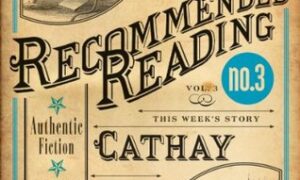 Haints Stay by Colin Winnette
Haints Stay by Colin Winnette
My rating: 3/5 cats



A hero would have charged through the front door, but she did not know any heroes. She knew dead men, and the men who’d killed them, and the boy.
this is one of those books that separates the hip from the unhip. i liked it, but i didn’t LOVE it. and i feel the judgments!

doubtless true.
early on, i felt this book would be friends with Dark Property or A Choir of Ill Children. both of those books take a traditional subgenre – post-apoc and southern gothic, respectively, and then throw a bunch of weird all over it. this one uses the western as its base coat and there’s all sorts of surreal splattering it, but i never had the feeling it was used as thoughtfully as the evenson or piccarilli. i’m generally fine with weird for weird’s sake, but i had the feeling there was meant to be more than that here – some commentary or some larger theme i was missing. i kept feeling that i was so close to having that “AHA!” moment, but either i missed the point or the author was circling something without ever connecting the dots.
i’m just confused, i guess. this book is being held up as “the” indie book of the summer – as this bold revisionist western. but this isn’t particularly “new” or “edgy,” this subverting the expectations of the western genre by making it either really ultraviolent or really weird. it’s not the first to borrow elements from noir and it’s by no means the first nihilistic western. “weird west” already exists as a pulpy subgenre, and people like robert coover, ishmael reed, rudolph wurlitzer and even richard brautigan have written more literary versions of the weird west, so it’s not like this is the first of its kind. and the heightened violence is definitely not new to the genre. there has always been an emphasis on violence in the western – it’s one of its defining characteristics, but the classic stuff; the louie l’amour stuff, was always a little more tasteful in deploying it. and then along came cormac mccarthy, paving the way for the modern reader with a taste for more graphic violence, which led to things like The Winter Family, joe r. lansdale, and my favorite bloody/weird mashup, Smonk. SMONK! and i myself am one of those modern readers with a taste for more graphic violence – i read a lot of grit lit and there’s frequently crossover into the western with grit lit, so i am fairly desensitized to violence, even when it is beautifully-written violence, so there’s nothing here that is shockingly new to me.
the writing here is fantastic in places. he’s great at the terse aphorism; a staple of the western:
*“It’s a graveyard,” said Bird.
“You’ll find that’s always the case,” said Sugar, “if you pay attention.”
*“Lots of things are going to come at you,” said Mary. “It is only the world saying hello.”
*“Left to their own devices, people will live out every possible variation of a human life.”
and, like most westerns, life is cheap. but here, even the characters meant to be redemptive are at risk View Spoiler » so you never really feel “safe” for anyone.
but i feel like winnette has less control over the surreal elements of the novel. the confusion starts early, and it never really lets up.
brooke and sugar are brothers and killers for hire. they arrive at a town where they are owed money for bloody services rendered to find it unrecognizable – burned to the ground, its citizens murdered, and under the new leadership of a tiny man with plenty of hired muscle. there is a tongueless old man, verbal sparring, unprovoked violence and then the page-nine reveal that sugar has a vagina.
so then you gotta go back and say “wait, what?”
i don’t consider that part a spoiler because – page NINE, but this is a bit more potentially spoilery. View Spoiler »
so we are forced to second-guess a lot of what’s happening. and that makes the occasional sloppy writing even more frustrating, because we don’t know if it is intentional or oversight. what are we to make of a character whose arm had been lopped off, just above where would have been an elbow who on the next page pushed from his wrists to set his weight upon his legs? or this sentence – He looked ill and miserable, like an old dog she and John had once put down together. It was only a puppy. is that careless or is it meant to give us pause, in a book where gender is uncertain and families and relationships are slippery – adopted children, pretend marriages, and where the supernatural will sit on a rock and have a conversation with a fella?
it’s a muddy kind of storytelling – it’s unclear what is real, what is imagined, what is supernatural. it occurs in a dreamspace but there’s a difference between deliberate vagueness for the sake of a surreal tone, and leaving loose ends because you don’t know how to wrap up the story or finish what you’ve started. too many times i had the feeling that i was reading the latter. too many times i thought something was being implied that wasn’t. for a long time, i thought brooke had some kind of magical healing powers – there are two scenes in which he boldly and unnecessarily displays a willingness to be stabbed as though he knows it won’t matter and: He looked as if he should be covered in scars, but all of the wounds he bore were fresh. so i thought there was something going on there, some ability he had, but nothing ever came of that. and i think that’s down to the tone setting up expectations; the reader is forced to fill in the gaps with their own explanations because there are too many details included that don’t solidify into anything meaningful.
Living was all winding around and doubling back.
that is a pretty good encapsulation of the shape of the novel – there are recurrences and mirroring, which give the reader pause, but again – to no thematic purpose.
my problems with the book were mostly in the details. the tone of the book was great, and the message that stood out most clearly to me in all the chaos was the way that the violence of this world leeches in and taints even the most innocent, and that this is what we call survival.
that most innocent character is bird – he’s a tabula rasa that arrives into the narrative naked and amnesiac without even fingerprints and he becomes shaped by his experiences and his victimization – hardened by the violent necessities of this world from a sweet kid who can’t even manage to kill a bird (in a really reader-squirmy scene) into a force for vengeance that will continue and contribute to this cycle of inevitable violence.
one of the novel’s central images stands in well for my overall feelings towards the book – a charred spiral staircase, all that remains in the middle of a burned-down town – it’s a beautiful and twisted thing in the center of chaos and destruction, but it ultimately goes nowhere.







